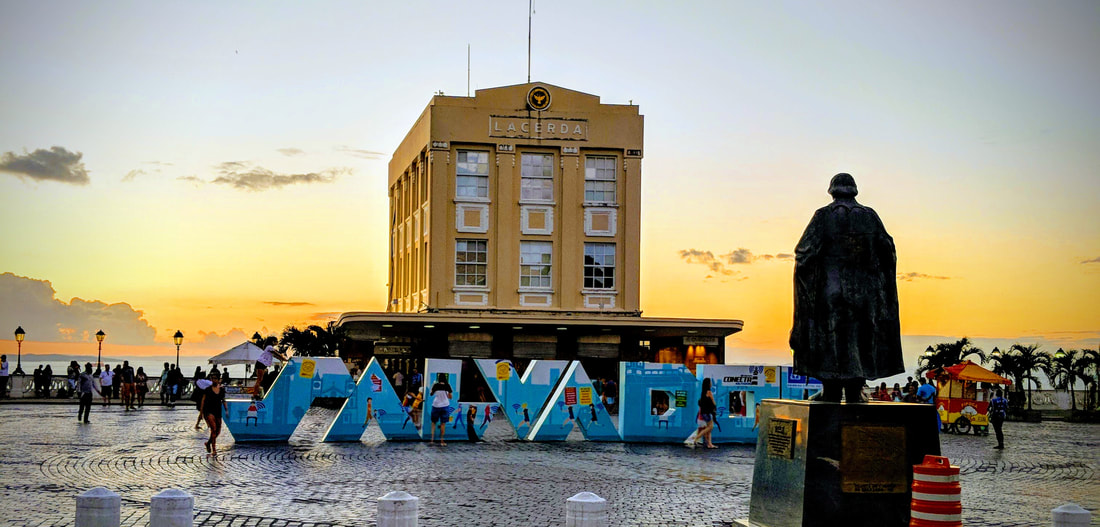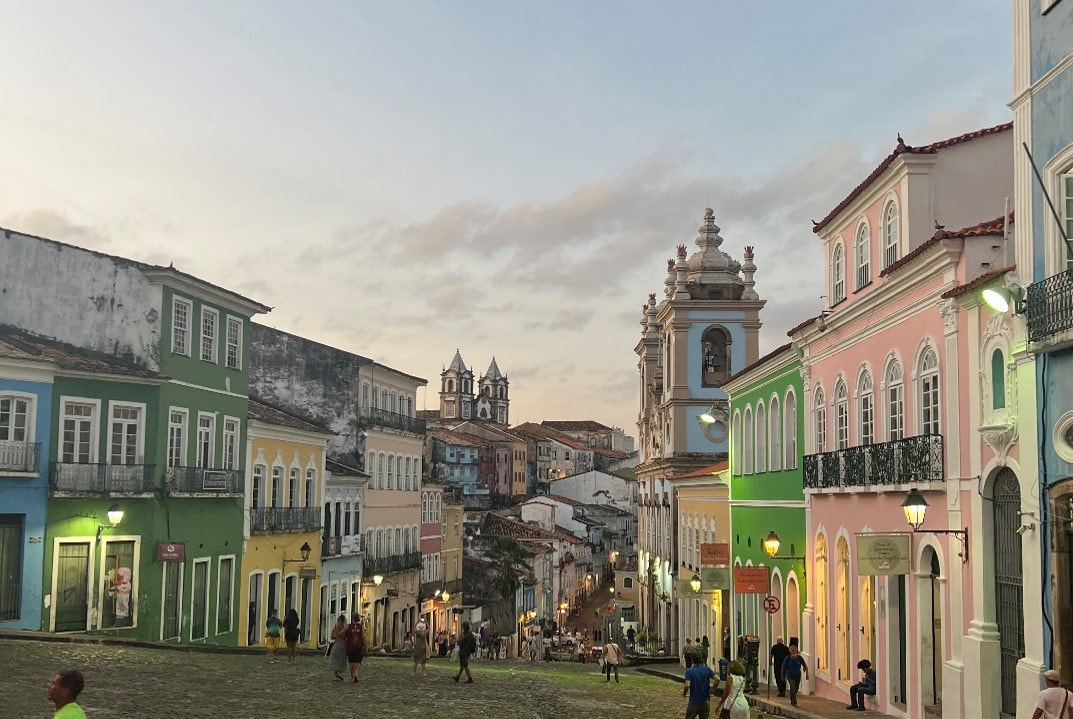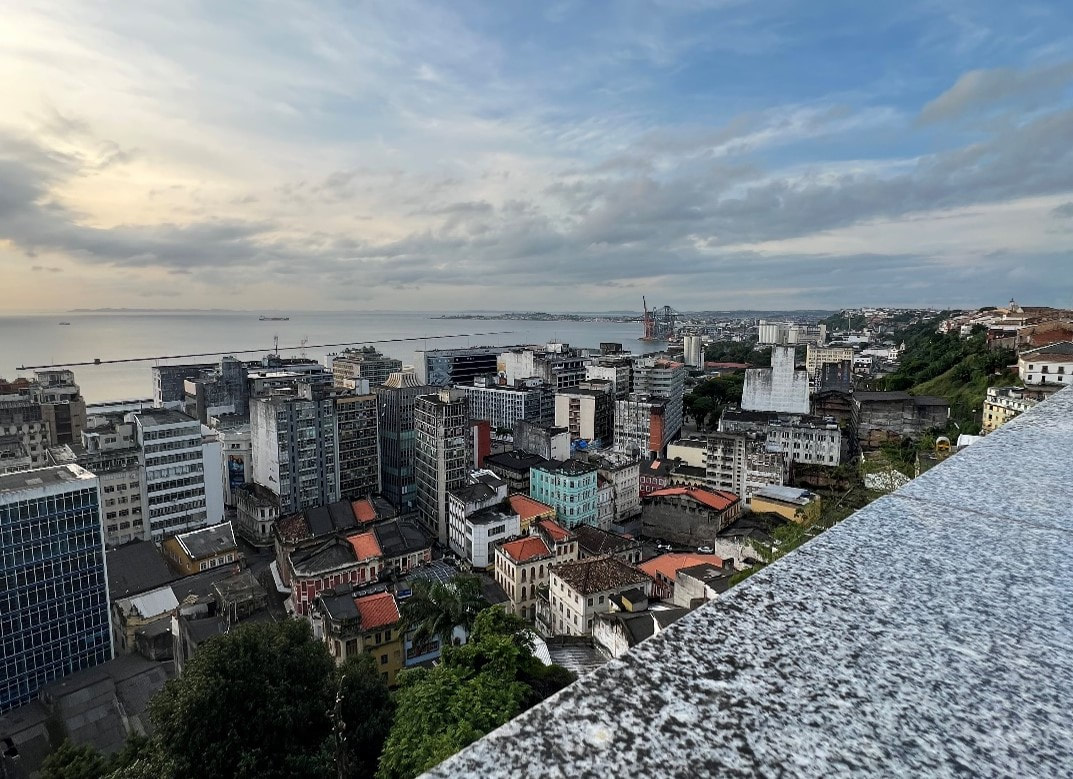|
By Kailee Hagl and Hailey Karnowski There are many political and social expectations we thought we would experience and observe while in Brazil. Throughout the semester, we studied race, gender, and inequality in Brazil. We read literature that focused on the LGBTQ+ community, political ideologies, environmental issues, and much more. In our study abroad portion of the class, we have observed and experienced specifics that either confirm or deny our expectations of Brazil after reading scholarly literature. We also find it important to address common misconceptions that we were able to debunk through our observations here. Much of our research prior to our trip to Salvador included the movements, notably high violence, discrimination, and misconceptions surrounding LGBTQ+ rights. With Brazil being the massive, diverse country that it is, we assumed that much of this could be visible amongst society and in the media in Brazil. According to one of our authors, Omar Encarnación, Brazil is “world-renown for celebrating sexual diversity and gender non-conformity” and persists in social movements despite political backlash (Encarnación, 2018). On Monday, May 17th, some of our expectations of the visibility of the LGBTQ+ movements were supported. Our trip to Pelourhinho, Salvador happened to be the same day of an LGBTQ+ historic day. Sure enough, hundreds of people crowded the streets celebrating the day of anti-homosexuality. Other than this one account, the appearance of LGBTQ+ culture and acceptance have yet to be seen—although this could be due to differences in culture and expression amongst the LGBTQ+ community in Brazil. Importantly, our research regarding LGBTQ+ rights in Brazil highlighted the high rate of violence against transgender and other LGBTQ+ individuals. With Brazil being one of (if not) the most dangerous countries for LGBTQ+ identifying individuals to live, we expected there to be some sort of acknowledgement of the presence of the transgender and gender non-conforming community. One article we explored mentioned not only the violence against LGBTQ+ members, but the negative actions such as deadnaming and religion enforcing that persists in Brazil as well (Calling, 2020). Again, we expected to see or hear about some of these encounters while being immersed in the Brazilian culture, but it is more than possible that the unfamiliar language spoken and lack of exploration of the entire culture has limited our observations. Despite this, we did expect to see more openly expressive LGBTQ+ and gender non-conforming community members than we have thus far. The literature about environmental issues addresses the ever-expanding urbanization of the country as well as the fight to preserve vegetations, especially the Amazon. So far in Brazil, we have seen how much of the larger cities are constructing more and more housing. This confirms our expectations as previous literature has stated metro areas in Brazil are expanding and deforestation is occurring. One author concludes, “Despite the effort to integrate the activities of conservation and preservation with the demands for expansion of the city, urban areas are still advancing on remaining vegetation areas” (Young 2013, 113). This also addresses our expectations as we expected to see efforts of conservation in populated areas that are continuing to grow. We constantly see workers planting trees and various plants; however, we also see buildings in construction everywhere. Therefore, what we have observed while abroad have both confirmed and denied our expectations. There are also common misconceptions that are important to address when discussing Brazil. The first is that Brazil is a poor country. This is not the case as Brazil has one of the quickest growing economies and is rich in natural resources. The country has a steadily increasing GDP as well. Although there are many poor areas with hillside houses, there are also many rich areas with skyscrapers. The second common misconception is that Brazilians do not experience racial inequality since they are essentially a melting pot of race and culture. This is also false, and there is literature to help confirm; “Inequality persists in Brazilian society and black activists have struggled to create a more equitable society” (Mitchell-Walthour 2017, 20). The inequality Afro-Brazilians experience affect them in all aspects of their lives, especially education. While abroad we learned about the Brazilian education system and how the system is rigged to benefit the rich and white, while making it harder for those who are black or poor to get into a federal university after high school. This confirms that Brazilians do experience inequality in their everyday lives. Overall, there are many political and social expectations we thought we would experience and observe while in Brazil, and our lectures, experiences, and observations have helped us to come to these conclusions. A final thought to keep in mind would be that everything is not always as it seems, and actually observing and experiencing something for yourself is an efficient way to conduct research and find answer to our hypotheses. References Calling, Nikita. 2020. “Stigmatization and Discrimination: A Qualitative Case Study of the Transgender Community in Brazil.” Lund University LUP Student Papers. https://lup.lub.lu.se/student-papers/search/publication/9011192 Encarnación, Omar G. 2018. “A Latin American Puzzle: Gay Rights Landscapes in Argentina and Brazil.” Human Rights Quarterly 40 (1): 194–218. https://search-ebscohost-com.ezproxy.csbsju.edu/login.aspx?direct=true&db=aph&AN=127958474&site=ehost-live&scope=site. Mitchell-Walthour, Gladys. 2017. The Politics of Blackness: Racial Identity and Political Behavior in Contemporary Brazil. The Politics of Blackness: Racial Identity and Political Behavior in Contemporary Brazil. https://doi.org/10.1017/9781316888742. Young, Andrea. 2013. “Urbanization, Environmental Justice, and Social-Environmental Vulnerability in Brazil.” In Urbanization and Sustainability: Linking Urban Ecology, Environmental Justice and Global Environmental Change, 95–116. https://doi.org/10.1007/978-94-007-5666-3_7.  Kailee Hagl is a junior at CSB/SJU and is majoring in Political Science with a focus on law. She also is pursuing a minor in Hispanic Studies, as well as a minor in Latin American Studies. She is originally from Sauk Centre, Minnesota. Kailee enjoys learning about politics in other countries, social justice issues, and analyzing court cases. She looks forward to applying her experience abroad to her academics in her final year at CSB/SJU.  Hailey Karnowski is a rising senior at the College of Saint Benedict, pursuing a major in sociology and minor in political science. She is originally from Farmington, Minnesota. Hailey is the new president of the CSB rugby team and works for IT Services. She hopes to work in social work or criminology after graduating and is looking forward to gaining new experiences and perspectives while studying abroad.
0 Comments
Leave a Reply. |
Archives
June 2024
Categories
All
|



 RSS Feed
RSS Feed
